Speakers: Angela Zhang, Mark Jia(moderator)
China has long been recognized as a powerhouse in cultivating Big Tech firms, emerging as a formidable rival to the United States in the digital era. However, recent developments have marked a dramatic shift. The Chinese government has embarked on a massive regulatory crackdown, targeting its largest tech corporations such as Alibaba, Tencent, and Meituan. Many Western experts have perceived China’s tech crackdown as the government’s assault on private businesses, causing growing doubts among investors whether Chinese firms are still investable.
In this book talk, Professor Zhang took us beyond the headlines to unravel the dynamic complexity of China’s regulatory governance. She argued that the crux of the matter lies not in why China needs to regulate but in how it goes about doing so. Drawing insights from her newly released book, “High Wire: How China Regulates Big Tech and Governs Its Economy,” she introduced the dynamic pyramid model of regulation, an analytical framework that demystifies Chinese regulatory governance. Additionally, she examined the impact of the tech crackdown on the administrative state, the competitive landscape, and global tech rivalry.
This event was co-sponsored by the Georgetown Center for Asian Law, the Institute for Technology Law & Policy at Georgetown Law, and the Georgetown China Law Society.
Events
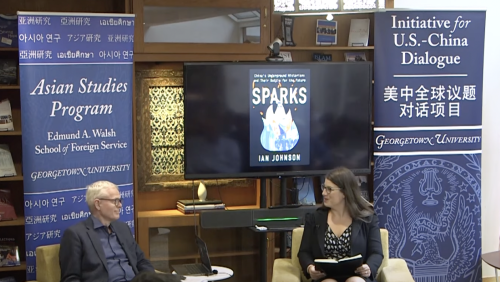
Sparks: China’s Underground Historians and Their Battle for the Future
Featuring: Ian Johnson
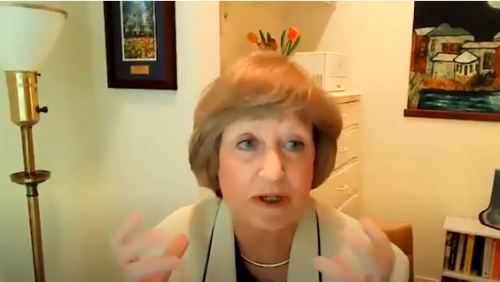
New Challenges in US-China Relations: Diplomacy, Trade, Global Health, & Technology
Featuring: James Feinerman, Anupam Chander, Lawrence Gostin, Jennifer Hillman
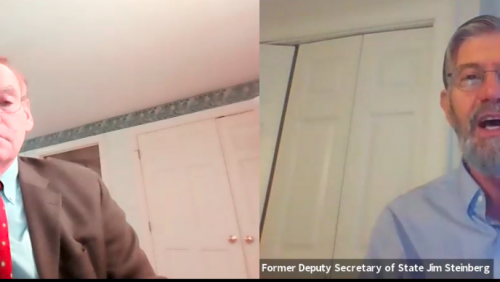
Shifting to Great Power Competition: Jim Steinberg Keynote Address
Featuring: James Feinerman, Jim Steinberg
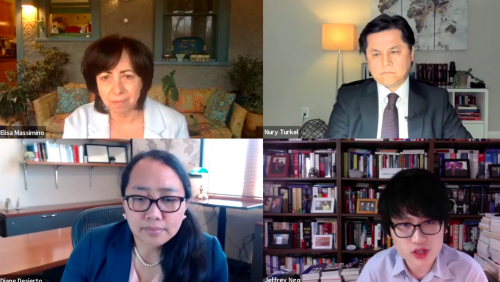
Shifting to Great Power Competition: Chinese Human Rights Challenges for the Biden Administration: The Uyghur people, Hong Kong, and Developing Trends
Featuring: Jeffrey Ngo, Nury Turkel, Diane Desierto, Elisa Massimino
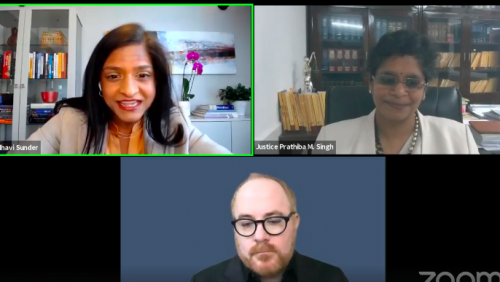
Access to Medicine Debates in the COVID-19 Era
Featuring: Indian Supreme Court Justice Prathiba M. Singh, Matthew M. Kavanagh, and Madhavi Sunder
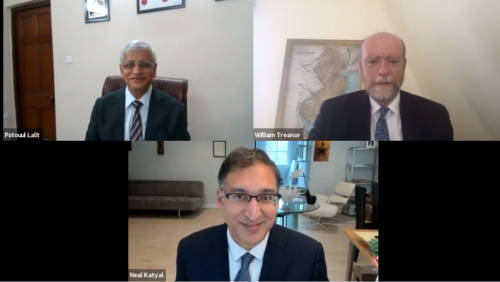
Keeping the Executive in Check: The Role of the Judiciary
Featuring: Indian Supreme Court Justice Uday Lalit, Dean William M. Treanor and Professor Neal Katyal
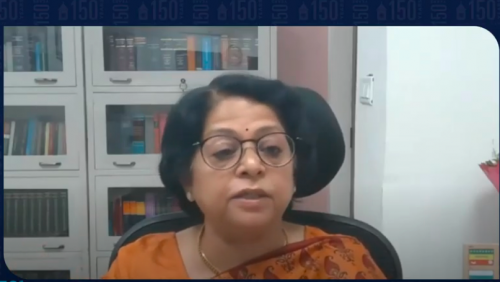
The Right to Health and the Constitution
Featuring: Indian Supreme Court Justice Indu Malhotra and Professor Lawrence Gostin
Past Events
Among the Braves: Hong Kong’s 2019 Protest Movement and the Struggle for Democracy in Hong Kong
November 8, 2023
Speakers: Shibani Mahtani, Timothy McLaughlin, Eric Yan-ho Lai (moderator)
Through the eyes of two frontline journalists comes a gripping narrative history of the Hong Kong pro-democracy movement centered around a cast of core activists, culminating in the 2019 mass protests and Beijing's brutal crackdown. In Among the Braves (2023), Shibani Mahtani and Timothy McLaughlin tell the story of Hong Kong’s decades-long push for democracy, and what the sacrifices of its people mean for the global struggle against authoritarianism. In this talk, Mahtani and McLaughlin shared highlights from their new book, and answered questions about the activists fighting on the frontlines in Hong Kong’s fight for democracy.
This event was co-sponsored by the Georgetown Center for Asian Law and the Human Rights Institute (HRI) at Georgetown Law.
Combating the Rise of Anti-Asian Bias in America
October 19, 2023
Speakers: Bethany Li, Gisela Perez Kusakawa, Mark Jia (moderator)
Since the beginning of the COVID-19 pandemic in the United States in the early months of 2020, there has been a dramatic rise in anti-Asian discrimination across the United States, including acts of violence against Asian Americans. At the same time, growing tensions in the US-China relationship have led some U.S. government officials, along with some U.S. states, to take actions in the name of national security that discriminate against Asian Americans. Many Asian American groups worry that vague and overbroad national security surveillance laws, for example, are being used to target Asian Americans who have committed no crime.
This panel discussed how national security rhetoric has been used to justify new laws and programs that discriminate against Asian Americans, and the steps that can be taken to protect the human rights of Asian Americans.
This event was co-sponsored by the Georgetown Center for Asian Law, the Human Rights Institute (HRI) at Georgetown Law, and the Asian Pacific American Law Students Association.
Sparks: China’s Underground Historians and Their Battle for the Future
September 29, 2023
Speaker: Ian Johnson
In this book talk Johnson shared highlights from his new book, Sparks: China's Underground Historians and their Battle for the Future (2023), which describes how some of China's best-known writers, filmmakers, and artists have overcome crackdowns and censorship to forge a nationwide movement that challenges the Communist Party on its most hallowed ground: its control of history.
Co-sponsored by Georgetown University’s Walsh School of Foreign Service Asian Studies Program, the Georgetown Center for Asian Law, and the Initiative for U.S.-China Dialogue on Global Issues.
Yvonne Tew: Constitutional Statecraft in Asian Courts
September 29, 2022
Speakers: Yvonne Tew, Jamal Greene, Samuel Issacharoff, Mila Versteeg,
Josh Chafetz (Moderator).
Panelists held a discussion on Professor Yvonne Tew’s book, Constitutional Statecraft in Asian Courts, moderated by Professor Josh Chafetz, with opening remarks by Dean William Treanor.
Co-sponsored by the Center for Asian Law.
Lawfare Live: Ukraine and the Future of National Security Law
April 20, 2022
Speakers: Scott Anderson, Brian Finucane, Todd Huntley, and Natalie Orpett (moderator).
Panelists discussed the Ukraine conflict’s impact on the law of armed conflict, state-based information operations, and more.
Co-sponsored by the Center for Asian Law, the National Security Law Society, and Lawfare. It is approved by Georgetown Law's Office of Student Life.
Trends in Legal Services Markets in the U.S. and China: Insights from Practitioners
March 2, 2022
Speakers: Kemeng Cai, Liang Ding, Xin Tao, Xiaowei Ye, and Shujun Tian (moderator), with opening remarks from Prof. James V. Feinerman.
The COVID-19 pandemic has had a massive impact on virtually every sector of the global economy, and the legal services sectors in China and the U.S. are no exception. Over the past two years, we have seen a number of changes, with firms adapting to the economic and public health impacts of COVID, often in real time. This panel discussion will discuss broader trends in both China and the United States, and explore the steps Georgetown Law graduates can take as they prepare to enter the job market.
Co-sponsored by the Georgetown Center for Asian Law, Office of Graduate Careers, Graduate Admissions, and Georgetown China Law Society.
Intellectual, Property, COVID-19, and the Next Pandemic Diagnosing Problems, Developing Cures
November 5-6, 2021
Speakers discussed IP, access to COVID vaccines, and protecting public health.
Co-sponsored by the Center for Asian Law, the O'Neill Institute for National and Global Health Law, the Institute for Technology Law & Policy, the University of Hong Kong Law & Technology Centre, and the University of Hong Kong Centre for Medical Ethics & Law.
New Challenges in US-China Relations: Diplomacy, Trade, Global Health, & Technology
July 28, 2021
Speakers: James Feinerman, Anupam Chander, Lawrence Gostin, Jennifer Hillman
The current U.S.-China relationship is fraught: Washington and Beijing are at loggerheads over a long list of issues, including allegations of state-supported cyberattacks, long-simmering trade tensions, a war of words over the origins of the COVID-19 pandemic, and concerns over rights abuses in Xinjiang and Hong Kong. Can the Biden administration chart a new course in U.S.-China relations, or will tensions inevitably continue to grow? This panel looked at several core dimensions of the relationship, and explore prospects for collaboration between the two countries on key issues of mutual concern.
Co-sponsored by the Center for Asian Law, the O'Neill Institute for National and Global Health Law, and the Graduate Program Admissions Office.
Violence Against Asian Americans: What Legal History Reveals
April 22, 2021
Speakers: Gabriel "Jack" Chin, Madhavi Sunder, William M. Treanor
The United States is experiencing what many call a surge of anti-Asian harassment, violence, and even murder. This wave is not unprecedented. Since the 1850s, the public policy of many states and territories, and ultimately the United States, was to discourage the presence of Asian people, who were regarded as inassimilable, ineradicably foreign, and undesirable additions to the American population. The desire to reserve opportunities for whites, and for political action against Asians, was often expressed through violence. The talk outlines anti-Asian policy in the United States, including racial denial of citizenship, the right to testify, to own land, to public benefits and employment, and to immigrate, and suggest some contemporary effects.
Cohosted by the Center for Asian Law and the Asian Pacific American Law Students Association (APALSA).
Shifting to Great Power Competition: Emerging and Continuing Threats with China
March 23-24, 2021
The Journal of National Security Law & Policy's annual symposium "Shifting to Great Power Competition: Emerging and Continuing Threats with China" included panels on technology disputes, South China Sea competition, human rights challenges, and a keynote interview with the Center for Asian Law’s James Feinerman and former Deputy Secretary of State Jim Steinberg.
Cohosted by the Center for Asian Law, the Center on National Security and the Law, and the Journal of National Security Law & Policy.
Revisiting the Access to Medicine Debate in the COVID-19 Era
March 5, 2021
Speakers: Justice Prathiba M. Singh, Matthew M. Kavanagh, and Madhavi Sunder.
What role do patents play in determining global access to the COVID-19 vaccine? This event considered the implications of the pandemic to the ongoing access to medicines debate, comparing the approaches of India and the US to patents and public health.
Cohosted by the Center for Asian Law, the Society for Democratic Rights, Georgetown University Law Center, Institute for Technology Law & Policy, and the O'Neil Institute for National and Global Health Law.
U.S.-Asia Trade and the U.S. Election: Pivot Point or Status Quo?
October 14, 2020
Speakers: Joongi Kim, Claire Reade, Lingling Wei, and James Feinerman.
As American voters head to the polls in November, the U.S. trading relationship with Asia has become a key issue in the campaign. Both President Trump and Vice President Biden have signaled their determination to fight for trade deals that protect American jobs; at the same time, both have accused the other of being secretly soft on trade.
Given the unusually prominent role that global trade -- and U.S.-Asia trade in particular -- has played in the 2020 campaign, what will U.S. trade policy look like in the years to come, either under a new Biden administration, or under a second Trump term? This panel of top experts will attempt to answer that question, with a particular focus on U.S. trade relations with China, Korea, and Japan.
Cohosted by the Center for Asian Law, Asian Pacific American Law Students Association, Korean American Law Students Association, the China Law Society, and the Japanese Law Association at Georgetown Law.
The China-Pakistan Economic Corridor and the Future of the Belt and Road Initiative
September 24, 2020
Speakers: Andrew Small, Rabia Akhtar, Jonathan E. Hillman, James Feinerman
The China-Pakistan Economic Corridor (CPEC) has been the single highest-profile investment package under China’s Belt and Road Initiative (BRI). A new report from the German Marshall Fund of the United States and Georgetown University Center for Asian Law, which will be published on September 24, looks at the evolution of CPEC, from its initial high ambitions to its slowdown to its mini-revival in the midst of the COVID-19 pandemic. It examines what we can learn for the future of China’s approach to the BRI and the Sino-Pakistani relationship.
Cohosted by the Center for Asian Law and GMF Asia.
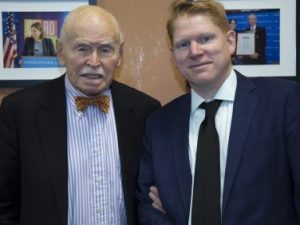
Law and Power in China, and in its International Relations
February 5, 2020
Speakers: Jerome Cohen, Thomas Kellogg
Professor Jerome A. Cohen is the senior American expert on East Asian law. As Director of East Asian Legal Studies at Harvard Law School from 1964-1979, he helped pioneer the introduction of East Asian legal systems and perspectives into American legal curricula. From 1979-2000 he initiated international business law practice relating to China. He is currently Professor of Law at NYU Law School, faculty director of NYU’s U.S.- Asia Law Institute, and adjunct senior fellow for Asian Studies at the Council on Foreign Relations. He is the author of numerous books and articles on Chinese law and politics.
Cosponsored by the Center for Asian Law, and the Georgetown Chinese Law Society.
The Dawn of a New Era for FDI in China: Practical Implications of China's New Foreign Investment Law
January 28, 2020
Speakers: Robert Lewis, James Feinerman, Lucille Barale
China’s new Foreign Investment Law, effective January 1, 2020, represents a fundamental shift in the foreign investment landscape for China, affecting not only all new foreign-investment enterprises going forward but also all 500,000+ existing FIEs. To provide practical insights on how to navigate this new legal environment, Robert Lewis, Senior International Counsel at Zhong Lun Law Firm in Beijing, will provide a detailed assessment of the impact of the new rules. Mr. Lewis was qualified in California in 1985 and, after working with a top national firm in Los Angeles for several years, he moved to China, where he has worked in top US, UK and Chinese law firms since 1993.
Cosponsored by the Center for Asian Law and the Georgetown Chinese Law Society.
Freedom to Marry in Taiwan: A Milestone for LGBT Rights in Asia
October 15, 2019
Speakers: Jennifer Lu, Joyce Teng, Nan Hunter, James Feinerman
Cosponsored by the Center for Asian Law, Georgetown Law Outlaw, Georgetown Law Asian Pacific American Law Students Association (APALSA), Georgetown University LGBTQ Resource Center
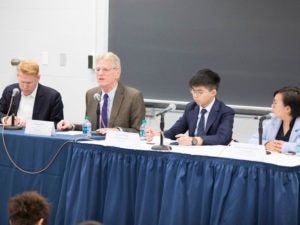
Hong Kong's Anti-Extradition Law Protests: Voices from the Movement
September 18, 2019
Speakers: Michael Davis, Bonnie Leung Wing-Man, Joshua Wong, James Feinerman, Thomas Kellogg
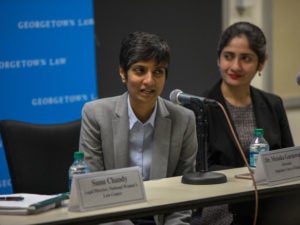
Transformative Constitutionalism: Litigating Against Section 377
February 7, 2019
Speakers: Dr. Menaka Guruswamy, Arundhati Katju, Sunu Chandy
Dr. Menaka Guruswamy, a Rhodes Scholar, practices law before the Supreme Court of India and is a Research Scholar and Lecturer at Columbia Law School under the B.R. Ambedkar Fellowship in Indian Constitutional Law.
Arundhati Katju practices law before the Supreme Court of India and holds law degrees from the National Law School of India University and Columbia Law, where she was a Human Rights Fellow, James Kent Scholar, and Public Interest Honoree.
Cosponsored by the Center for Asian Law, Georgetown India Initiative, Georgetown Law Outlaw, Georgetown University LGBTQ Resource Center, and the Georgetown South Asian Law Students Association (SALSA).
International Law and Japan’s Foreign Policy
February 6, 2019
Speakers: Ambassador Kazutoshi Aikawa
Ambassador Kazutoshi Aikawa (Chargé d'Affaires, ad interim) is the Deputy Chief of Mission at the Embassy of Japan in Washington, a post he assumed in October 2017. He is also the current Permanent Observer of Organization of American States (OAS). Prior to his present position, he served as Director General of Disarmament, Non Proliferation and Science, Ambassador at the Ministry of Foreign Affairs of Japan. In 2014, Ambassador Aikawa was Councilor at Japan’s Cabinet Secretariat after serving as the Deputy Director General (ASEAN/APEC SOM, G7 Sous Sherpa) at the Ministry of Foreign Affairs of Japan. His diplomatic experience include serving in various outposts such as Japan’s Permanent Mission to the United Nations in New York, and the Embassy of Japan in Tehran. Ambassador Aikawa joined the Ministry of Foreign Affairs in 1983 and holds a BL degree from the University of Tokyo and an LLM from Colombia Law School.
Cosponsored by the Center for Asian Law, Japanese Law Association at Georgetown (JLAG), Asian Pacific American Law Students Association (APALSA), Foreign Lawyers at Georgetown (FLAG), Georgetown International Law Society (GILS), Georgetown Law ASEAN Society, and the Georgetown National Security Law Society.
Inside the Asian Infrastructure Investment Bank
September 20, 2018
Speakers: Natalie Lichtenstein, James Feinerman
Natalie Lichtenstein is a US lawyer who has specialized in legal issues at international financial institutions and legal development in China since the 1970s. Following a 30-year legal career at the World Bank, she continues to teach and consult in these areas. From 2014- 2016, she served first as the Chief Counsel for the establishment of the Asian Infrastructure Investment Bank, and then as its inaugural General Counsel.
Cohosted by Center for Asian Law, Georgetown China Law Society, Institute of International Economic Law.
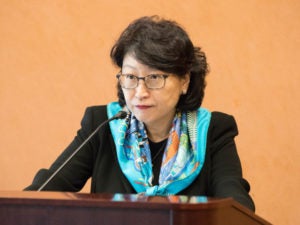
Dynamics of International Legal Norms
July 13, 2018
Speaker: Teresa Cheng
Teresa Cheng, Hong Kong’s Secretary for Justice, explains that "while international law as a discipline is European in origin -- with Asian states, upon gaining independence, expected to respect what was already in place -- Asia will play a significant role in influencing international law in the future, especially with respect to special economic zones, climate change and dispute resolution."
Careers in Chinese Law: Environmental Public Interest Law
February 26, 2018
Speaker: Zhang Jingjing
Zhang Jingjing, one of China's leading environmental lawyers and also a top expert on Chinese overseas investment, will speak about her career path and her public interest work in China and the United States. Ms. Zhang is the founding litigation director of the Center for Legal Assistance to Pollution Victims, China University of Political Science and Law, and a founding partner of the Huanzhu Environmental Public Interest Law Firm in Beijing.
End of an Era: How China's Authoritarian Revival is Undermining Its Rise
March 22, 2018
Speakers: Carl Minzer, James Feinerman
Carl Minzner is a Professor of Law at Fordham Law School. He is an expert in Chinese law and governance, and has written extensively on these topics in both academic journals and the popular press.
Anti-Domestic Violence Law and Women’s Rights Litigation in China
November 17, 2017
Speaker: Li Ying
Li Ying is a leading women’s rights advocate and public interest lawyer specializing in issues relating to gender equality and domestic violence. She is the Director of Beijing Yuanzhong Gender Development Center, and had served as Executive Director of the China Anti-Domestic Violence Network and Executive Director of the prominent Peking University Women’s Legal Research and Service Center, China’s first NGO specializing in providing legal aid to women. Over the past decade, Ms. Li has handled hundreds of cases, including groundbreaking cases in domestic violence, employment discrimination, and sexual harassment.
Cohosted by Law Asia and the Georgetown China Law Society.
Asia's Reckoning: China, Japan, and the Fate of U.S. Power in the Pacific Century
November 9, 2017
Speaker: Richard McGregor
Richard McGregor's Asia's Reckoning is a compelling account of the widening geopolitical cracks in a region that has flourished under an American security umbrella for more than half a century. The toxic rivalry between China and Japan, two Asian giants consumed with endless history wars and ruled by entrenched political dynasties, is threatening to upend the peace underwritten by Pax Americana since World War II. Combined with Donald Trump's disdain for America's old alliances and China's own regional ambitions, East Asia is entering a new era of instability and conflict. If the United States laid the postwar foundations for modern Asia, now the anchor of the global economy, Asia's Reckoning reveals how that structure is falling apart.
Legal Advocacy as Liberal Resistance: The Experience of China’s Human Rights Lawyers
October 19, 2017
Speaker: Dr. Eva Pils
China’s human rights lawyers insist that the Party-State follow the law in all cases, including those deemed ‘sensitive’ by the authorities. For years, rights lawyers have faced a repressive system that views rights advocacy as an act of subversion. In the Xi Jinping era, the contrast between their liberal outlook and the authoritarian system has become sharper, and rights defenders are now increasingly treated as enemies. As they engage in legal resistance, these lawyers test the boundaries of the right of resistance as a human right.
Indian Supreme Court Justice Jasti Chelameswar and Senior Advocate Sajan Poovayya
October 11, 2017
Speakers: Jasti Chelameswar, Sajan Poovayya
Cohosted by Law Asia, South Asian Law Students Association, Amnesty International, OutLaw, Muslim Law Students Association
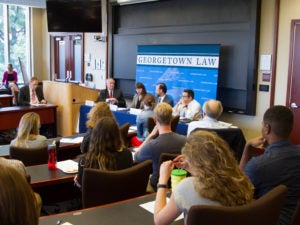
North Korea Nuclear Crisis: Problems and Paths Forward
September 13, 2017
Speakers: Daryl Kimball, David Koplow, Jenny Town, Jonathan Wolfsthal
Cohosted by Law Asia, the Center on National Security and the Law, the National Security Law Society, the Asian and Pacific American Law Students Association, and the Korean American Law Students Association
